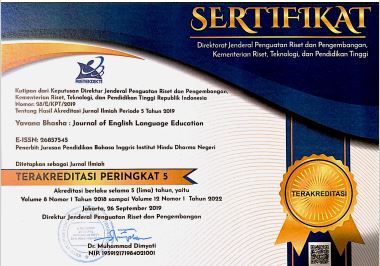
|
Journal title |
: Yavana Bhasha: Journal of English Language Education |
 |
Yavana Bhasha: Journal of English Language Education is a double-blind peer-reviewed journal dedicated to enhancing and disseminating empirical studies and conceptual ideas within the fields of English Language Teaching especially focusing on:
- Teaching English as a second or foreign language,
- English language teaching and learning,
- English language teachers' training and education,
- English literature and English teaching,
- Language Materials Development and Evaluation,
- Linguistics Studies,
- Translation Studies,
- and other studies and perspectives relevant with English language education and applied linguistics.
Yavana Bhasha: Journal of English Language Education is published by the English Language Education Department of Universitas Hindu Negeri I Gusti Bagus Sugriwa Denpasar every March and August. It is currently indexed in several international academic publication databases, e.g. Google Scholar, Science and Citation Index (Sinta), and Garba Rujukan Digital (GARUDA). p-ISSN: 26204983 e-ISSN: 26857545






